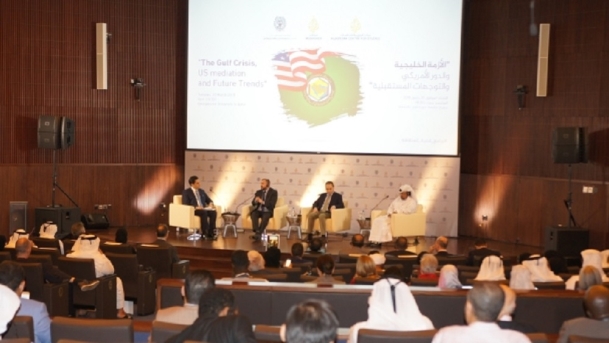
A joint research seminar organised on Tuesday, 20 March 2018, in Doha by Al Jazeera Center for Studies, in concert with Georgetown University in Qatar and Al Jazeera Mubasher, concluded that the United States (US) is no longer the sole power with substantial influence in the countries of the Gulf Cooperation Council (GCC), thanks to fallout from the crisis that began in June 2017, which remains unresolved. Seminar participants mentioned other countries, such as Russia, Iran and Turkey, that have acquired increased sway over Gulf policies and decision-making.
Looking to the Gulf summit called by the United States in May to discuss ways of resolving the Gulf crisis, speakers said the likelihood of actually convening the conference was low and that they had minimal expectations for the outcome, largely because the principal parties to the crisis, particularly Saudi Arabia, the United Arab Emirates (UAE) and the US, are not yet convinced that a resolution is in their interest.
Seminar participants said that the blockading countries’ objective in sparking the Gulf crisis was to change the regime in Qatar and take control of the country’s natural resources. Participants added that the blockading states had failed to achieve their objectives.
The seminar opened with a speech by the dean of Georgetown University in Qatar, Dr. Ahmad Dallal. Noting the importance of the seminar being held at the university, Dallal said it promoted the cross-fertilisation of ideas between academics and media personnel, allowing for a richer, more profound discussion of the topic at hand.
Qatari media figure Abdul Aziz Al Ishaq spoke about the history of Qatari-Saudi relations since the era of King Abdul Aziz Al Saud, concluding that the Saudi ruling family views Qatar as a subsidiary of Saudi Arabia. Al Ishaq said the objective of Saudi Arabia and the UAE was to bring down the Qatari regime, replace it with one that would be subordinate to them, and take control of Qatar’s resources and bounty. But, Al Ishaq added, these two states, along with Egypt and Bahrain, failed in their objectives. Qatar has overcome the shock of the blockade, while the Qatari people’s connection to their leaders has thwarted these states’ desire to overthrow the regime.
Rory Miller, a professor of governance and state administration at Georgetown University in Qatar, said that in the past the US had set the tone of Gulf policy, but under the administration of President Donald Trump, this role has declined, especially as Trump seemed to have sided with Saudi Arabia and the UAE at the outset of the crisis. However, Miller said, Washington is now looking for a way out of the crisis that would preserve its own interests. He concluded that the current Gulf crisis could offer the US a chance to solidify its strategic ties with the region’s states and restore its status and active role.
Steven Wright, associate professor of international relations at Hamad Bin Khalifa University, said that the economic aspect of the Gulf crisis is important for the US, but even more significant are the related strategic dimensions. Wright pointed out that Australia, the US, and Russia are seeking to increase their production of natural gas, which could have an adverse impact on the Qatari economy in the future.
Speaking of the structural shift in regional and international relations caused by the Gulf crisis, Abdul Aziz Al Ishaq said that the crisis fostered new ties unpalatable to Washington, including ties with Russia, Turkey and Iran, and led to a diversification of sources for arms imports rather than solely US arms. There is currently talk of a Russian military base in the Gulf, and Gulf decision-making is more independent of the US than it was prior to the crisis.
Discussing the chances of success of the upcoming meeting between the GCC countries at Camp David, Al Ishaq indicated he does not hold high expectations. If the meeting indeed goes forward, he said, it might untangle some of the threads of the crisis, but it will not resolve the crux of it because the blockading states and the US have not yet determined that it is in their interest to do so. Al Ishaq said there might be some limited breakthrough in specific issues like the pilgrimage, the lesser pilgrimage, and exports and imports, but this meeting is not expected to result in a full resolution of the crisis. He added that a crisis of this magnitude also requires an international guarantee against future recurrence. Al Ishaq concluded that even if the crisis were resolved politically, the social repercussions would persist for a generation or two between the Gulf peoples who had been harmed by it.